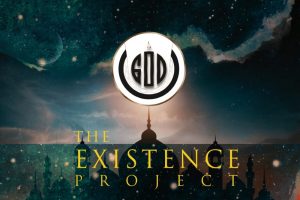The Divine authorship of the Qur’an is a matter rationally beyond doubt, and quite verifiably so. The simple fact that there is an unignorably substantial amount of knowledge of the unseen in the text of the Qur’an proves that the words of this Book poured forth, not from the mind of the unlettered mortal who claimed to be the recipient of this revealed text, but from an Omniscient God – the “Knower of the Unseen,” to whom this text is rightfully attributed. The Author of the Qur’an could not even plausibly have been human, for the simple reason that knowing the unseen and perceiving the unperceivable is by no means a human attribute. This happens to be, both by definition and as a comprehensibly rational concept, something entirely “Divine.” Matters of the unseen belonging to diverse timeframes, along with those relating to different places, can be found throughout the Qur’an. Hence, it would be safe, not to mention rational, to infer that the Author of the Qur’an is a Being whose perception and knowledge both transcend the bounds of time and space. The sheer quantum of knowledge of the unseen present in the Qur’an is sufficient to verify the absolute existence as well as the absolute awareness of its Author. It securely stands as an irrefutable testimony to the Qur’an’s claim of veracity. The Holy Qur’an proclaims that the name of its Author is “Allah.” Allah, according to the Qur’an, is most intriguingly, both the Ghayb or the “Unseen” and the Aalim ul Ghayb or the Knower of the unseen.” He is the Ghayb because His Being is not perceivable to man’s physical senses. He is Aalimul Ghayb because He alone truly knows Himself. In other words, He is the Hidden Treasure and He alone knows how He can be found. Thus, according the Qur’an, since only Allah knows Himself, therefore in order to know Him, one must turn to what His Revealed Word, the Qur’an, informs us about Him.
Allah begins the text of His Revealed Word – the Qur’an – with an introduction of Himself – the Author. The very first verse of the Holy Qur’an reads, “In the name of Allah, the Gracious, the Merciful.”1 This is the first, foremost and fundamental introduction of who and what, the One True God is. He informs us of who He is by His Personal Name – Allah. He then proceeds to inform us succinctly of what He is, by introducing us to two attributive names of His—Rahman and Raheem. Rahman and Raheem are therefore the primary two attributive names of God mentioned in the Qur’an. Interestingly, both these names, Rahman and Raheem, are derived from the Arabic expression Rahma, which means “Mercy.” The first of these two attributive names of God, Rahman, can be translated as “Gracious.” Raheem can be translated as “Merciful.” Both these attributive names are simply two aspects of the Mercy of God. One aspect of God’s Mercy, which reveals itself as an innate urge on the part of God, regardless of whether Divine Mercy has been earned or not, is the aspect of Rahman. The other aspect of God’s Mercy, expressed by the name Raheem, manifests itself in response to all human conduct that attracts and invites God’s Mercy. Of course, God’s response, as Raheem, is as a rule, disproportionately greater in measure than man’s conduct. Hence, according to the Qur’an, whether man receives Divine Mercy as sheer Grace or earns it as an Award, he remains in all circumstances, a recipient of the Mercy of God.
It is more than evident that no one – none whosoever – can conceivably place God under any obligation or binding of any kind – none but He Himself. The Qur’an reveals to us this enchanting and ultimately hope-inspiring secret, that God has Himself, by His own choice and will, made it binding upon Himself, to eternally show Mercy to all. Hence, we read in the Qur’an, “He has Himself, made Mercy, obligatory upon Himself.”2 Mercy is, therefore, not only an innate attribute of God, it is also an eternal commitment that God has taken upon Himself.
According to the Qur’an, God’s Mercy envelops His entire creation. Nothing, according to the Qur’an, lies outside the bounds of His Mercy. A conscious and wilful effort would be required to even momentarily escape the gravitational pull of the all-encompassing Mercy of God, and that too, would eventually be frustrated by His Absolute Mercy. Let us consider, for instance, the case of the rebelliously disobedient sinner. Even if his persistent sins deprive him of God’s pleasure and earn him punishment, the torment itself will serve only to cleanse the sinner’s soul and prepare him for a final and eternal bliss. The cleansing process would serve as a vehicle to Paradise. Hence, even God’s punishment, as it appears from our point of view, is in reality, an expression of His eternal Mercy. Whether God forgives man’s faults out of compassion, or punishes him in order to reform and purify him, His Mercy is in command. We read, “He forgives whomsoever He pleases and punishes whomsoever He pleases, and Allah is Most-Forgiving, Merciful.”3 Jahannam, the Qur’anic term for “Hell,” is therefore a place where a polluted soul is cleansed of all the impurities and maladies that afflict it. Jahannam, too, is therefore a materialisation of the Mercy of God. In other words, Jahannam or Hell, is the state in which the human soul is burnished to the point that all its rust is removed. This is true, not only regarding the Hereafter, but also in relation to this life. The tribulations of this life too, are as a matter of fact, known to arouse the dormant human spirit from its slumber. At the level of nations and communities, adversities are, on the same note, known to draw people out of their collective state of inertia. Suffering, pain, and calamity, although veritably undesirable from man’s point of view, are merely curative measures from God’s point of view, and thus expressions of Mercy. Sometimes, suffering manifests itself as a trial whose reward is infinitely greater than the measure of its pain. God’s Mercy encompasses not only His creation, but also His own attributes. This means that His mercy encompasses His wrath too. His wrath is subservient to His Mercy and a manifestation of His Mercy. God says in the Qur’an, “My Mercy encompasses all things.”4
Whereas the true believer, according to the Qur’an, beholds the Mercy of God perpetually at play, the disbeliever tends to miss it even when it presents itself right before his eyes. The believer never loses hope in God’s Mercy and his receiving it, while the disbeliever becomes despaired of it. We read in the Qur’an, “Those who disbelieve in the Signs of Allah, and in meeting with Him, it is they who are despondent of My Mercy.”5 This Divinely revealed principle will tend to work both ways: those who are despondent of God’s Mercy will find themselves deprived of faith, and those who lack faith will eventually become despondent of God’s Mercy.
God’s Mercy, according to the Qur’an, is unconditional. He seeks nothing in return. God is reliant on none. He expects and seeks nothing in return from His creation. We humans have indeed been created to worship Him, but not because He needs our worship, but merely because true worship is the path that leads us to our purification. In terms of being absolutely Independent, God is aloof. In terms of being the Merciful, God is concerned. Hence, His “aloofness” is not in the sense of being indifferent and cold, but in the sense of not being reliant on anyone but Himself, and being the Transcendent God. On the other hand, His indulging in the welfare of His creatures is not because He needs them, but because they need Him. We read in the Qur’an, “And thy Lord is Self-sufficient – the Possessor of Mercy.”6
All Messengers of God were, in their own times, and to the extent of their assigned missions, embodiments of the Mercy of God. Mosesas was God’s Mercy embodied, for the people of Israel. Zoroasteras was God’s Mercy embodied for the people of Iran. Krishnaas was God’s Mercy embodied for the people of India. Finally, when in God’s absolute Wisdom, humanity was ready to receive the final and universal revealed message, God, according to the Qur’an, chose Muhammadsa as an embodiment of His Mercy – His Mercy unto the entire human race. Addressing the Holy Prophet Muhammadsa, God says in the Qur’an, “And We have not sent thee but as Mercy Embodied for all the worlds.”7 The expression “world,” the Arabic for which is Aalam, refers to each unit of human collective existence. Its plural, Aalameen, meaning “worlds,” would thus refer to all units of human collectivity, be they nations or communities or races.
According to the Qur’an, the Holy Prophet Muhammadsa is designated as Rahmatul lil Aalameen, meaning “Mercy for all mankind.” But then God further expounds this by informing us that the mercy displayed by God’s chosen ones, is in reality a manifestation of God’s own Mercy. Addressing His beloved Messenger, Muhammadsa, God says in the Qur’an, “And it is by the Mercy of Allah, that thou art compassionate towards them.”8 Thus, the most merciful of all humans and the most compassionate of all men – Muhammadsa – was what he was because he was able to mirror the Mercy of God. By the same rule, the love and compassion shown by parents, too, is in reality, a reflection of Divine Mercy.

All revealed scriptures and books of God, are signs of the Mercy of God towards mankind. His Mercy demands that He guide us, whether we deserve His Guidance or not. Referring to the Holy Qur’an, God says, “And verily, it is a Guidance and a Mercy for the believers.”9 We also read, “And surely, We have brought them a Book, which We have expounded with Knowledge, Guidance and Mercy.”10 This principle does not apply exclusively to the Qur’an, but in fact, to all revealed books of God. Hence, regarding the Torah, the Word of God revealed to Mosesas, God says, “[…] preceded by the Book of Moses – a Guide and a Mercy.”11
The Holy Countenance of Allah – the Gracious, the Merciful – is in simple words, the bewitching countenance of Mercy. To attain His nearness, therefore, one must diligently tread the path of mercy. To become worthy of God’s special love and mercy, one must learn to show and share love and mercy with the creatures of God. To become true disciples of the Holy Prophet Muhammadsa, whom God crowned as the “mercy for mankind,” one must committedly follow the ways of mercy. To benefit from the light of the Qur’an, which God has declared the Book of Mercy, one must imbibe and emit the quality of mercy. It was unto the unending path of mercy that the Holy Prophet Muhammadsa invited us, when he said, “Show mercy to those in the Earth and He who is in Heaven will show mercy unto you.”12
Endnotes
1. The Holy Qur’an, Sura Al-Fatiha, Verse 1.
2. The Holy Qur’an, Sura Al-An’am, Verse 13.
3. The Holy Qur’an, Sura Aal-e-‘Imran, Verse 130.
4. The Holy Qur’an, Sura Al-A’raf, Verse 157.
5. The Holy Qur’an, Sura Al-‘Ankabut, Verse 24.
6. The Holy Qur’an, Sura Al-An’am, Verse 134.
7. The Holy Qur’an, Sura Al-Anbiya’, Verse 108.
8. The Holy Qur’an, Sura Aal-e-‘Imran, Verse 160.
9. The Holy Qur’an, Sura Al-Naml, Verse 78.
10. The Holy Qur’an, Sura Al-A’raf, Verse 53.
11. The Holy Qur’an, Sura Hud, Verse
12. Hadith of Tirmizi.




Add Comment